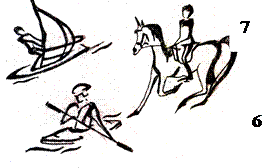
Читайте также:
|
Shopomania has come to Russia. Uncontrollable passion for shopping brought to ruin many Europeans and Americans. Now it’s our turn. Even experienced foreigners get a shock when they see the way some Russians behave in shops. Shopomania went pear-shaped in our country. Not only oligarchs’ wives but also common people suffer from this new social disease: they manage to leave incredible sums of money in shops and widespread consumer credits tempt them to waste more and more. The vast majority of people realize that they are sick only at the moment of payoff, but sometimes it may be too late.
Oniomania has plenty of reasons. People deprived of something in the childhood are the first victims. The most part of shopaholics are people with serious complexes, thinking that they don’t meet the modern life standards. These days glamour ideology prevails in the society, which makes a person earn money in order to spend all it on houses, cars or expensive clothes. Russia is a country of extremes. During shop-tours abroad Russian people behave like barbarians.
Another reason of oniomania is great amount of commercials and advertisements. Billboards, beautiful pictures of basically useless products drive Russians crazy.
The interesting fact is that Russian female student spend about 20 percent of their salary on cosmetics and very often these are high-class products. Sometimes this kind of passion may even destroy lives or relationships as the vast majority of Russian men can’t understand why a young beautiful girl should waste money on a cream priced at 900 rubles (33dollars).
Nevertheless, oniomania overcame not only the fair sex but lots of men, too, and their number is increasing. Generally men are addicted to purchasing cars, books, technical equipment and its constituents. In some forms of oniomania men have surpassed women.
Should one take this phenomenon as a disease? Scientists note: craft of oniomania lies in the fact that Russian people don’t consider it to be a disease. However, any person is able to get over the addiction; success is very often directly connected with a shopaholic’s capability to give a negative answer to the question: do I really need this thing?
3. Read the statements. Decide whether each statement is true or false.
a. Uncontrollable passion for shopping isn’t a social disease for Russia, only Europeans and Americans suffer from it.
b. Not only oligarchs’ wives but also common people suffer from oniomania.
c. The first victims of oniomania are people who had everything in their childhood.
d. The most part of shopaholics are people with serious complexes, thinking that they don’t meet the modern life standards.
e. During shop-tours abroad Russians behave like cultural people.
f. Great amount of commercials and advertisements isn’t a reason of oniomania.
g. Oniomania overcame not only the fair sex but lots of men, too.
4. Answer the following questions:
a. Why do experienced foreigners get a shock when they see Russians in shops?
b. When do people begin to understand that they are shopaholics?
c. What kind of ideology does prevail in our society?
d. What kind of female passion, according to the text, is harmful for relationships between men and women?
e. What goods do men generally spend money on?
f. What question is very useful to get over the oniomania’s addiction?
5. What is your own attitude to shopaholics? Are they really sick people? Is shopomania a social disease or just a normal way of living for many people? Discuss each of the arguments in the table carefully. Think of any new arguments you can add. See p.103
| Against | For |
| 1. It is not normal for people to want to buy basically useless products, it is craziness. 2. Clothes, technical equipment and other goods are things that help people feel comfortable. And it is enough to have only one fur-coat, one television, one car, etc. 3. 4. | 1. We live only once and it is normal to buy everything we want. 2. Shopomania isn’t a disease. Shopping is a good way to relax and to forget about problems, even if you buy useless things. 3. 4. |
Writing

 The Manager
Sportscene 66 Chapel Road
Long Street CARDIFF
CARDIFF
21st May 2006
Dear Sir/Madam,
I’m writing to complain about a pair of Nike sneakers I
bought in your main shop two Saturdays ago and the way
your assistant spoke to me when I called in it the
following Monday to return them.
I bought this pair – they were very fashionable ones –
after I saw you were advertising a sportswear sale.
However, the first time I wore them I realized that there
were different in colour laces in them.
When I explained it to the assistant he told me he couldn’t
give me my money back because I don’t have a receipt.
I demanded to see the manager but I was told that it
wasn’t possible because you were on holiday.
I insisted that as you weren’t there he should give me my
money back but unfortunately he became extremely rude.
I enclose the pair of sneakers and I must ask you to let me
have a full refund immediately (5,6).
Yours faithfully,
Stuart Blake
The Manager
Sportscene 66 Chapel Road
Long Street CARDIFF
CARDIFF
21st May 2006
Dear Sir/Madam,
I’m writing to complain about a pair of Nike sneakers I
bought in your main shop two Saturdays ago and the way
your assistant spoke to me when I called in it the
following Monday to return them.
I bought this pair – they were very fashionable ones –
after I saw you were advertising a sportswear sale.
However, the first time I wore them I realized that there
were different in colour laces in them.
When I explained it to the assistant he told me he couldn’t
give me my money back because I don’t have a receipt.
I demanded to see the manager but I was told that it
wasn’t possible because you were on holiday.
I insisted that as you weren’t there he should give me my
money back but unfortunately he became extremely rude.
I enclose the pair of sneakers and I must ask you to let me
have a full refund immediately (5,6).
Yours faithfully,
Stuart Blake
|

1. Give at least one reason why you might write to complain to:
· a shop
· a telephone company or the Post Office
· a transport company (taxi, bus, train)
· a builder, plumber or electrician
· a language school
2. Write a letter of complaint
a) Choose a situation from Exercise 1 and make notes.
b) Divide your letter into three paragraphs (see the boxes below)
Use the expressions in brackets if you wish (5, 6).
| PARAGRAPH 1 Say why are you complaining. (I’m writing to draw your attention to… /to object to…) | PARAGRAPH 2 Give background Information, such as precise details of the problem, how you discovered it and how you feel about it. (I think it’s awful that…; I’m very surprised that such a reputable organization as yours...) | PARAGRAPH 3 Request action. (I feel Something ought to be done to…; It’s time you…; I will take further action if…; I demand that you…; Please replace…; I would be grateful if you could…) |
 |

Speaking
1. Read the dialogue ‘In a clothes shop’. Underline the expressions which help you to buy a necessary thing.
Assistant: Can I help you?
Customer: Yes I’m looking for a white blouse. or
No, I’m just looking, thanks. or
I’m being served, thanks.
Assistant: What size are you?
Customer: Er, 46 usually.
Assistant: OK. Here we are. The last one in stock.
Customer: Great. Where is the changing room? I want to try it on.
Assistant: It’s down there on the right. Well, how is it?
Customer: Fine. I’ll take it. Where do I pay for it?
Assistant: Over at the cash desk.
Customer: And can I pay by credit card?
Assistant: Surely.
2. Look at the lines of some conversations in a clothes shop. a) Who says them, the customer or the shop assistant? Put C or A.
Can I try it on? Yes, it feels fine.
Mm, that’s nice. It is a bit too big/small/long/short.
Medium. $ 25.
Can I help you? Yes, I’m looking for a jumper.
Is it the right size? No, I don’t like the colour.
How much is it? What about this one?
Have you got something bigger? That’s the last we have got.
By credit card. I’ll have it, please.
This one is a bit darker. I’ll leave it, thanks.
What size are you? What colour are you looking for?
Blue. Thank you. How would you like to pay?
Yes, the changing rooms are over there.
b) Match the lines to make short dialogues.
3. Work in pairs. Make a big conversation using real clothes.

1. Put the verbs in brackets in the correct form (Present Simple or Present Continuous).
 1. We (go) to the seaside every summer. 2. Listen! Somebody (knock) on the door. 3. How often you (wash) your dog? 4. She can’t come to the phone. She (wash) her hair. 5. Where (be) Kate? She usually (sit) in the front row. I (not know) why she (sit) here now. 6. Please be quiet! The baby (sleep). 7. What you (laugh) at? 8. I hardly ever (work) on Mondays now. 9. The countryside (be) wonderful especially when it (snow). 10. Why you (smoke) here? – And where people usually (smoke) in this building?
1. We (go) to the seaside every summer. 2. Listen! Somebody (knock) on the door. 3. How often you (wash) your dog? 4. She can’t come to the phone. She (wash) her hair. 5. Where (be) Kate? She usually (sit) in the front row. I (not know) why she (sit) here now. 6. Please be quiet! The baby (sleep). 7. What you (laugh) at? 8. I hardly ever (work) on Mondays now. 9. The countryside (be) wonderful especially when it (snow). 10. Why you (smoke) here? – And where people usually (smoke) in this building?
2. Each sentence has a mistake. Find it and correct it.
a) I’m going to the cinema tonight.
b) How much you earn in your job?
c) We no wear a uniform at my school.
d) That’s my husband over there. He stands near the window.
e) Sorry. You can’t speak to Jenny. She’s have a bath.
f) Peter is a businessman. He’s work all over the world.
g) At the moment Peter’s work in Russia.
h) Where your sister work? (19).
3. Imagine that you are at a party. Look around and say what the guests are doing and what they are wearing.
4. How much or how many?
1) ……………………………… cups of tea does your father drink at teatime?
2) ……………………………… kittens has your cat got?
3) ……………………………… bread do you eat with soup?
4) ……………………………… books do you carry in your schoolbag?
5) ……………………………… milk did your mother put in your porridge?
6) ……………………………… salt does your granny usually put in your salad?
7) ……………………………… snow is there in the streets of Moscow in winter?
8) ……………………………… skates have you got?
9) ……………………………… moons are there in the sky?
10) ……………………………. children has your aunt got?
11) ……………………………. juice can you drink when you are thirsty?
12) ……………………………. spaghetti does your mother buy?
13) ……………………………. days are there in September?
 14) ……………………………. apples grow on your apple-tree?
14) ……………………………. apples grow on your apple-tree?


The Christmas season has an early start in England. In October the first Christmas cards appear in the shops. As early as the beginning of December, Christmas trees are already glittering in most homes.
Christmas Eve is on the 24th of December. On this day everybody is very busy and in a hurry. On Christmas Eve children hang their Christmas stockings on their beds or fireplace. They wait for Santa Claus.
Christmas Day is on the 25th of December. British people celebrate this holiday with big family dinners. Traditionally they eat Christmas pudding and a big roast turkey. Most people do not go to work on that day.
Every English family sends and receives many Christmas cards. Traditionally there is robin on a card, as it is a Christmas bird. Many years ago postmen had bright red coats. They looked like robins.
 Traditionally people put their Christmas presents into boxes. That is why the day on which they give and receive these boxes is called Boxing Day. It comes after Christmas Day. It is on the 26th of December. But the name of this day also goes back to the past when boxes of food and gifts were given to the poor. Today this is a day of relaxation, sporting events, dances or maybe going to the theatre. Families with children often go to see pantomimes – often shortened to ‘panto’ – which is a very popular custom.
Traditionally people put their Christmas presents into boxes. That is why the day on which they give and receive these boxes is called Boxing Day. It comes after Christmas Day. It is on the 26th of December. But the name of this day also goes back to the past when boxes of food and gifts were given to the poor. Today this is a day of relaxation, sporting events, dances or maybe going to the theatre. Families with children often go to see pantomimes – often shortened to ‘panto’ – which is a very popular custom.
Words:
1. glitter – блестеть, сверкать
2. turkey – индейка
3. robin – малиновка
4. poor - бедняки



| In this unit you will… o Read a story about climbers o Talk about sports and practice telephoning o Write an inquiry letter o Learn about Past Simple and Past Continuous |
Vocabulary
 | |||
| |||
 | ||||||
|
| |||||
1. Match
the sports from the box
to the pictures 1-8 (there are some extra words in the box). Study the rest of the key words. Use your dictionary if necessary to check the meaning of some ‘sport’ expressions. Learn the words.
| Sports: horseriding, mountaineering, diving, swimming, skiing, weight-lifting, windsurfing, rafting, rugby, hockey, tennis, baseball, squash, cricket, golf, football, American football, basketball, volleyball, motor racing, running, athletics. Place: gym, court, football pitch, skating-rink, circuit,ski slope, track. Equipment: ski, stick, skate, puck, swimsuit/trunks, bat, dumbbells, ball, surfboard, racket, raft/kayak, racing car. Ball: throw a ball, kick a ball, pass a ball, hit a ball (e.g. with a rocket), catch a ball, head a ball. Expressions: play a sport, do a sport, be into a sport, go+Ving (e.g go swimming),to V (e.g. swim), take up a new sport (e.g. I want to take up golf = start)), give up (=stop), support a team, get/keep fit (=keep body healthy), Score: n.,v. draw (the same number of goals, e.g. 2-2), We write 2-2, but say ‘two-all’, lead (Brazil is leading Chile 2-1), beat (Brazil beat Chile 2-1). |
2. How many kinds of sport do you know? Write down:
5 games where you can hit the ball (with various kinds of equipment).
4 games where you can pass the ball.
3 games where you can catch the ball
2 games where you can kick the ball
1 game where you can head the ball
3. Organise the key words from the box above and put them in the correct column below.
| Sport | Place | Equipment |
| Swimming | ……. | ………… |
| ………… | stick, skates, …. | |
4. Fill the gaps with the correct word. More than one variant is possible. See key words.
do lifting mountaineering motor racing rafting play
1) Do you …………………………………….gymnastics?
2) I only …………………………….volleyball in summer.
3) We still like watching …………….……………………...
4) Jack doesn’t have much opportunity now to go …………
5) Do you still do a lot of weight…………………………….?
6) I plan to ……….(start) golf when I get older.
7) You should ………smoking if you want to be healthy.
8) You need to take more exercises if you want to ………(get in good condition).
5. Answer these questions. If possible discuss your answers with someone else.
1) What sport do you do/play?
2) Do you take sport seriously or do it just for fun?
3) Are you very competitive?
4) Are you good at any sports?
5) Do you belong to any sport club?
6)Do you like physical training lessons?
7) What kinds of sport competitions are held in your university?
8) Do you like to take part in different competitions?
Дата добавления: 2015-10-23; просмотров: 303 | Нарушение авторских прав
| <== предыдущая страница | | | следующая страница ==> |
| Grammar Focus | | | Grammar Focus |